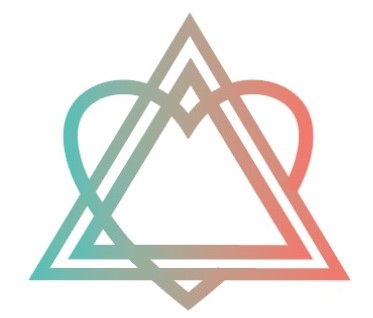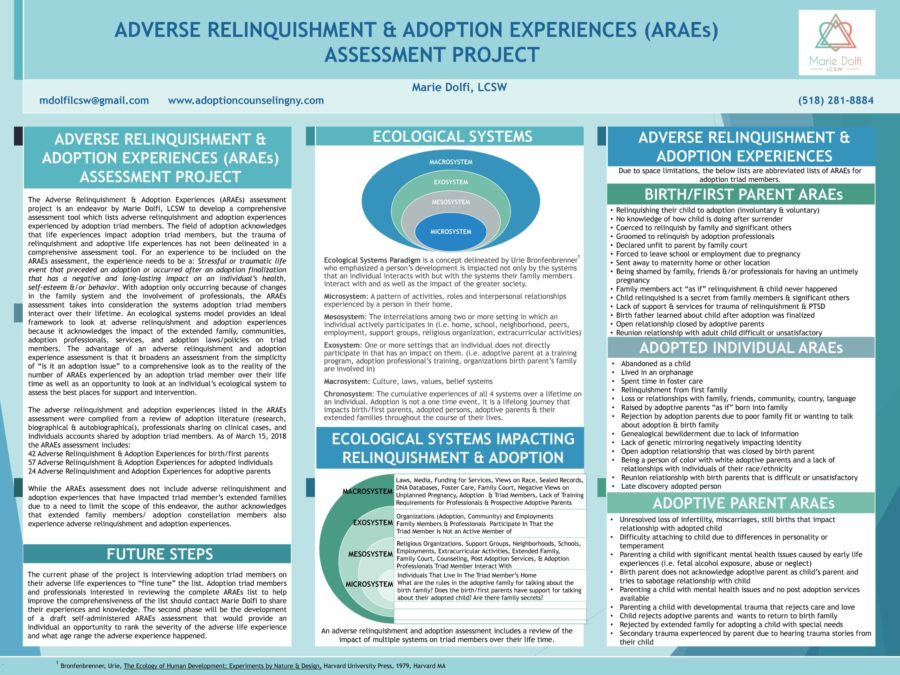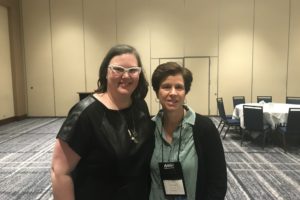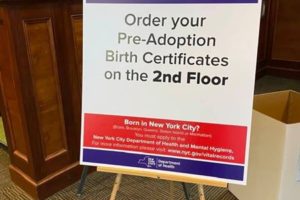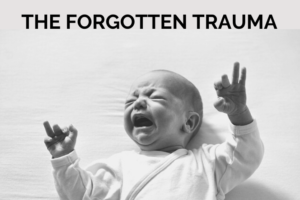The Adverse Relinquishment & Adoption Experiences (ARAEs) assessment project is an endeavor by Marie Dolfi, LCSW to develop a comprehensive adoption clinical assessment tool that lists adverse relinquishment and adoption experiences experienced by adoption triad members. The field of adoption acknowledges that life experiences impact adoption triad members, but the trauma of relinquishment and adoptive life experiences has not been delineated in a comprehensive adoption clinical assessment tool. For an experience to be included on the ARAEs adoption clinical assessment, the experience needs to be a: Stressful or traumatic life event that preceded an adoption or occurred after adoption finalization that has a negative and long-lasting impact on an individual’s health, self-esteem, and or behavior.
With adoption only occurring because of changes in the family system and the involvement of professionals, the ARAEs adoption assessment takes into consideration the systems adoption triad members interact over their lifetime. An ecological systems model provides an ideal framework to look at adverse relinquishment and adoption experiences because it acknowledges the impact of the extended family, communities, adoption professionals, adoption services provided, and adoption laws, regulations on adoption triad members.
The advantage of an adverse relinquishment and adoption experience clinical assessment is that it broadens an assessment from the simplicity of “is it an adoption issue” to a comprehensive look at the total number of ARAEs experienced by an adoption triad member. Some birth parents, adopted persons, and adoptive parents will have traumatic life experiences resulting in having the symptoms of post-traumatic stress disorder or complex post-traumatic stress disorder. Counseling and stress management techniques are key for helping people heal from trauma.
It is the hope of Marie Dolfi that adoption research on adoption triad member’s lives uses a broader view of life experiences using an adoption clinical assessment like ARAEs to have a more accurate assessment of adoption issues. Additionally, an ecological perspective provides a framework to look at an individual’s ecological system to assess the best places for support and intervention. Working with an adoption counselor that understands the complexities of being an adoptee, birth parent, or adoptive parent is invaluable.
The adverse relinquishment and adoption experiences listed in the ARAEs assessment were compiled from a review of adoption literature (research, biographical and autobiographical), professionals sharing on clinical cases, and individual accounts shared by adoption triad members. As of 9/29/2021, the ARAEs assessment includes:
- 56 Adverse Relinquishment and Adoption Experiences for birth/first parents
- 78 Adverse Relinquishment and Adoption Experiences for adopted individuals
- 31 Adverse Relinquishment and Adoption Experiences for adoptive parents
While the ARAEs assessment does not include adverse relinquishment and adoption experiences that have impacted adoption triad member’s extended families due to a need to limit the scope of this endeavor, Marie Dolfi acknowledges that extended family members (adoption constellation members) also experience adverse relinquishment and adoption experiences.
Marie’s ARAEs poster is available on the 2018 Rudd Adoption Conference website.
Assessment Update: The initial phase of the project of interviewing adoption triad members about their adverse life experiences has been completed. The next phase is to locate a professional who specializes in psychological assessments who can help with operationalizing the adverse experiences on the list. After the assessment has been operationalized, the next step would be testing a draft self-administered ARAEs assessment that would provide an individual an opportunity to rank the severity of the adverse life experience and what age range the adverse experience happened. It is Marie Dolfi’s hope that an assessment tool for adverse relinquishment and adoption experiences will lead to a more in-depth and precise view of adoption triad members’ life experiences.
The ARAE’s assessment is not released to the public because there is an overlap with the experiences on the list. For an assessment tool to be used accurately, it needs to be standardized with no overlap. Not having any training on creating assessments Marie Dolfi cannot do this herself.
The Adverse Relinquishment and Adoption Experiences Assessment is based upon the ecological systems paradigm delineated by Urie Bronfenbrenner (The Ecology of Human Development) which emphasized a person’s development is impacted not only by the systems that an individual interacts with, but the systems their family members interact with as well as the impact of the greater society. Bronfenbrenner identified the following ecological systems: microsystem, mesosystem, exosystem, macrosystem, and chronosystem.
The ARAEs assessment cannot be reproduced without the written consent of Marie Dolfi. This information is protected by copyright.
Adoption Ecological Systems
Adoption Macrosystem- society, laws, culture, stigmas: sealed foster care and adoption records, sealed original birth certificates, Multiethnic Placement Act, unenforceable post-adoption contact agreements, laws on safe haven relinquishment, lack of laws requiring legal representation and true options counseling for anyone considering adoption for their child, laws on termination of parental rights, Hague Treaty of Intercountry Adoption, negative societal view on adoption and adoption triad members, lack of training in college degree programs on adoption issues for social workers and mental health professionals, lack of supports for prospective birth/first parents with untimely pregnancies, lack of post-adoption services for adoptive families and birth/first parents, unnecessary extended stays in foster care and inefficient family court systems, adoption microaggressions acceptable in society, views on race and transracial adoption, political climate of countries that encourage intercountry adoption
Adoption Exosystem- systems that family members participate in that indirectly impact the adoption triad member: availability of support groups for adoption triad members; availability of adoption professionals (case managers, social workers, home study providers, the agency workers, attorneys) with training on options counseling, relinquishment and adoption issues, communities that extended family members were involved in at the time of the untimely pregnancy
Adoption Mesosystem- systems that the individual was or is involved in (extended family, employment, community, neighborhood, school): foster care (level of care, length of stay), orphanage (level of care, length of stay), relationship with adoptive parents prior to placement, the racial diversity of community and school for adopted individuals who are a person of color being raised by white parents, relationships with individuals of their race/ethnicity for individuals who are a person of color being raised by white parents, mentors for adoptive parents on parenting a child who joins the family by adoption, birth/first parent’s support system at the time of their untimely pregnancy and post-adoption, birth/first mother kicked out of school, home, or lost their employment due to their untimely pregnancy, maternity homes, support groups, conferences for adoption triad members
Adoption Microsystem- individuals in the adoption triad member’s home: support or lack of support available to adoption triad members around the core issues of adoption; do family members pretend that relinquishment of a child did not happen to the birth family; do adoptive parent believe it is disloyal to talk about the birth family and adoption issues The chronosystem is the environmental events and transitions that occur throughout an individual’s life including but not limited to changes in: family members, community, education, employment, resources, and sociohistorical events
Disclaimer: While Marie hopes that you find the information on her website useful and informative please note- the information contained in this website is for general information purposes only. There are no representations or warranties of any kind, express or implied, about the completeness, accuracy, reliability, suitability, or availability with respect to the resources listed on the website or the information, services, or related graphics contained on the resources listed on her website. Any reliance you place on such information is therefore strictly at your own risk. The website has links to other websites which are not under the control of Marie Dolfi, LCSW. Marie has no control over the nature, content, and availability of those sites. The inclusion of any links does not necessarily imply a recommendation or endorse the views expressed within them.
